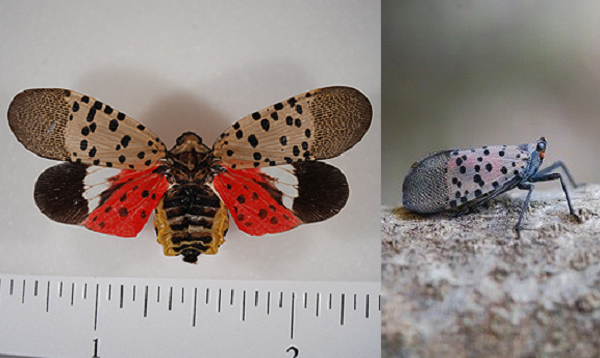Community
Mass. Agricultural Officials urge residents to check for Spotted Lanternfly

BOSTON — The Massachusetts Department of Agricultural Resources (MDAR) has announced that a single dead specimen of spotted lanternfly, an invasive pest, was reported and confirmed at a private residence in Boston. As a result, MDAR urges the public to check for signs of spotted lanternfly adults in any potted plants that they may have received over the holiday season and to report any potential sightings of this pest by clicking this link and by taking photographs and collecting a specimen if possible. Residents should look for large, gray insects, about one inch long, with black spots and red underwings.
“Early detection plays an important role in the protection of the economic and ecological resources of our state from invasive species,” said MDAR Commissioner John Lebeaux. “We ask all residents who have received potted plants this past December to help us protect Massachusetts’ environment and agricultural industries by checking for and reporting signs of spotted lanternfly.”
The insect appears to have been unintentionally transported this past December in a shipment of poinsettia plants originating from Pennsylvania. Because only one dead adult insect was found, and spotted lanternfly die off when a hard frost hits, there is currently no evidence that this pest has become established in Massachusetts. However, additional surveys are planned in the area to confirm that no other occurrences of lanternfly are present.
Spotted lanternfly (Lycorma delicatula) is an invasive sap-feeding insect from Asia that was first found in the United States in 2014 in Pennsylvania. While the main host plant of this pest is tree-of-heaven (Ailanthus altissima), spotted lanternfly attacks a variety of trees, shrubs, and vines, and has the potential to impact a broad range of agricultural commodities, including apples, peaches, grapes/wine, maple syrup, as well as the ornamental nursery industry.
-

 Community6 years ago
Community6 years agoNational Shrine of La Salette Festival of Lights 2017 set to begin
-

 Community6 years ago
Community6 years agoMassachusetts State Police looking for good home for retired dogs
-

 Crime6 years ago
Crime6 years agoFall River ranked most dangerous city in Massachusetts according to report
-

 latest6 years ago
latest6 years agoDurfee student allegedly overdoses on marijuana
-

 Community6 years ago
Community6 years agoVideo of Fall River Police goes viral
-

 Causes6 years ago
Causes6 years agoMissing Fall River woman found deceased
-

 Crime6 years ago
Crime6 years agoFall River Police add names to most wanted list
-

 Causes6 years ago
Causes6 years agoFall River teenager reported missing has been found




